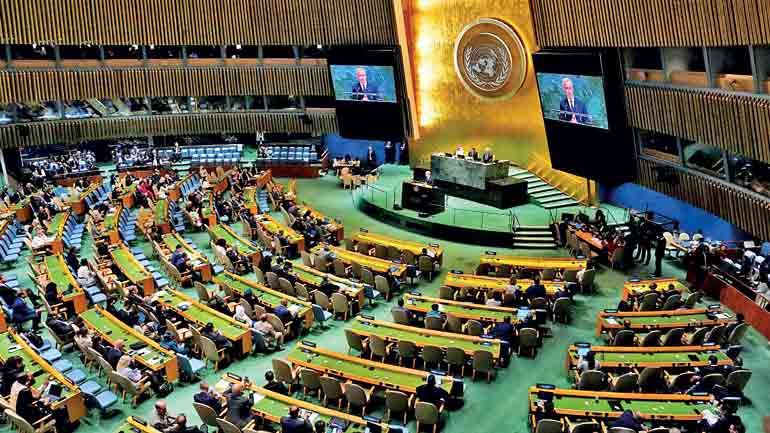Monday Feb 16, 2026
Monday Feb 16, 2026
Tuesday, 30 September 2025 00:01 - - {{hitsCtrl.values.hits}}

If blocked by a veto-wielding country, the UNGA has the means to bypass the Security Council
An immediate ceasefire in Palestine, which is being bombed every 8-9 minutes according to the UN spokesperson Stephane Dujarric, was deadlocked at the Security Council last week through a veto by the United States of America. A deadlock which blocked a potential halt to the killing of civilians at a scale and intensity that the world has not seen in living memory outside of World War II.
Thankfully, all is not lost at the United Nations. In this situation of deadlock where there is a threat to global peace and security, the UN General Assembly (UNGA) isn’t entirely helpless. If blocked by a veto-wielding country, the UNGA has the means to bypass the Security Council by invoking a 1950 Resolution known as Uniting for Peace, Resolution 377 A(V), which gives the General Assembly the power to recommend a number of mechanisms including the use of force.
Christian Tomuschat, Professor Emeritus at Humboldt University, Berlin explains: “Obviously, the crucial element of Resolution 377 A (V) was the affirmation that the General Assembly may, if deemed appropriate by it, recommend collective action, including the use of force.”
The ‘Uniting for Peace’ Resolution has been invoked over a dozen times thus far. Professor Tomuschat writes that the tenth emergency special session, which dealt with the Israeli occupation of Palestinian territory “started in 1997 and has not yet come to its end. (It was adjourned by resolution ES-10/16 of 17 November 2006, para. 13, and can at any time be resumed upon request by Member States.)”
Kushtrim Istrefi, Associate Professor of Public International Law and Human Rights Law at Utrecht University writes that the “ICJ in its advisory opinion on Kosovo has affirmed the legal weight of the Uniting for Peace resolution.” (https://opiniojuris.org/2025/09/17/uniting-for-peace-in-gaza-a-test-for-the-general-assembly/)
Human rights experts urge use
 On 5th September, a few weeks ago, in Geneva, 45 United Nations human rights experts called on “Member states to act under ‘uniting for peace’ in line with General Assembly Resolution 377 V and recommend a peace operation.” They warned that “Silence and inaction are not an option in the face of mass atrocities”. (https://www.ohchr.org/en/press-releases/2025/09/gaza-un-experts-urge-general-assembly-respond-famine-and-genocide)
On 5th September, a few weeks ago, in Geneva, 45 United Nations human rights experts called on “Member states to act under ‘uniting for peace’ in line with General Assembly Resolution 377 V and recommend a peace operation.” They warned that “Silence and inaction are not an option in the face of mass atrocities”. (https://www.ohchr.org/en/press-releases/2025/09/gaza-un-experts-urge-general-assembly-respond-famine-and-genocide)
The group of experts which included the universally respected Francesca Albanese, Special Rapporteur on the human rights situation in the Palestinian territories, occupied since 1967, said that the “situation in Gaza is intolerable and unconscionable.”
The UN Experts (known as UN Special Procedures) had a message for the leaders of governments in their message: “At this critical moment, the world needs the General Assembly — the highest body of the United Nations — to take decisive leadership and act to prevent further catastrophe”.
They asked the leaders, who should feel ashamed, the following: “Already, half a million people in Gaza are starving. Have State authorities become so numb to these numbers — so de-sensitized, once again, to the systematic breaches of our collective moral and legal obligations?”
They urged the General Assembly “to act without delay to stop the machinery of death”.
Sri Lanka’s stand
Around the world, people are gathering in their tens of thousands to protest the horrors visited by Israel on the civilians in Palestine. Some of their governments have responded by recognising Palestinian statehood. This could lead to full membership of the United Nations.
Sri Lanka which had already recognised Palestine as a State, has traditionally been vocal on its support for its people, often endorsing a two-state solution. However, there has been ambivalence at actually voting at UN forums which censure Israel for its manner of conducting its war against Hamas’s terrorism. The fear of the consequences of speaking plainly at such forums, which by no means is limited to Sri Lanka, has guided their work at the UN. Such anxiety is not baseless, as the influence Israel wields with many capitals around the world is considerable. The most recent carnage in the Middle-East appears to have somewhat eroded that hesitancy as moral outrage and empathy for the victims have taken primacy in most countries.
Not so much in Sri Lanka. A mainstream English-language Sunday newspaper noted that President Anura Dissanayake had avoided mentioning the very term Israel in his statement at the UNGA, despite his words of sympathy with Gaza. Earlier, Sri Lanka had condemned the attack on Doha, Qatar, without mentioning the perpetrator, Israel.
The NPP government has continued the practice of the previous administration of including Israel in its list of countries for foreign employment for Sri Lankans and has encouraged tourists from Israel to come to Sri Lanka visa-free, including IDF soldiers on Rest and Recreation. The government’s stance on the skirmishes in the Southern beaches between these tourists and some locals was reportedly circumscribed by the spend-per-tourist at those resorts. Given these trends, Sri Lanka’s stance on a possible emergency session under UN Resolution 377 V is difficult to predict.
Sri Lanka which had already recognised Palestine as a State, has traditionally been vocal on its support for its people, often endorsing a two-state solution. However, there has been ambivalence at actually voting at UN forums which censure Israel for its manner of conducting its war against Hamas’s terrorism. The fear of the consequences of speaking plainly at such forums, which by no means is limited to Sri Lanka, has guided their work at the UN
Calls from leaders, celebrities, academics
A few days ago, at an event in New York, President of Columbia Gustavo Petro announced his plans to invoke Resolution 377 V at the UNGA, seeking a positive vote by all 193 members, to authorise sending an international protection force to Palestine. The head of the Green Party in the US, Jill Stein, Roger Waters, (Ex-Pink Floyd), and Brian Eno (famous avant-garde composer) took to social media to appeal to the general public to support this initiative and to request people to pressure their governments to join forces in this endeavour.
Associate Professor Kushtrim Istref, writing a piece in Opinion Juris titled “Uniting for Peace in Gaza: A Test for the General Assembly” said that “Action under Uniting for Peace is no guarantee of immediate practical impact. However, at the very least, it would ensure that the UN continues to uphold international law, including humanitarian law, mobilise states and agencies, and sustain its own constitutional integrity.”
As the Sumud Flotilla carrying aid to Gaza nears its destination, massive protests around the world calling on their governments to use their leverage to stop the violence in Gaza, and growing calls for effective action by the UNGA, perhaps this time, the nobility and resilience of the people of Gaza in the face of unimaginable suffering, may motivate the urgent action needed to save them.